こんにちは。フォックス淳子@香港です。昨日のSCMPに大きく載った、番組出演中のおじさまの写真(Reuters版)を見ると
やはり!座っている時、内股になっている。手も組んでいる。うーむ。
どうでもいいと思われるかも知れませんが、私はこういう妙に神経質な動作やあの甲高い声を聞いて以来、それまで彼に抱いていた印象がガラリと変わりました。
[china 4669] Re: 朱首相胡弓弾く!
> *****
ウワー、またおじさま、中国愛国ネット小僧らに「売国奴」呼ばわりされないかしら。8日北京で日本の記者団相手に「対日“柔軟”発言」した後もBBSでメッタメタにやられてました。中国の「言論の自由」も大したもんです。(実はこの話が今日の記事の前奏だったりする)
> > TV session a question of tact
> *****
SCMPは、サイトに行くと、記事ごとに「この記事をお友達に送ろう」メール機能が付いているので、メーリングリスト等への転載も大丈夫だと思います。へへ。
ついでに、インターネット版はお休みにつき出なかった昨日日曜日の、この番組関連記事も、続けてお贈りします。それは余り面白くないですが、収録時には入っていて、放映時にカットされた発言が出てきます。あっついでに、今日の新聞から、それに関する記事も。すごく長くなりますが、最後まで読むとサービスで(笑)高行健の話も出てきますので、頑張って下さい。ファイトォ!
やはり!座っている時、内股になっている。手も組んでいる。うーむ。
どうでもいいと思われるかも知れませんが、私はこういう妙に神経質な動作やあの甲高い声を聞いて以来、それまで彼に抱いていた印象がガラリと変わりました。
[china 4669] Re: 朱首相胡弓弾く!
> *****
ウワー、またおじさま、中国愛国ネット小僧らに「売国奴」呼ばわりされないかしら。8日北京で日本の記者団相手に「対日“柔軟”発言」した後もBBSでメッタメタにやられてました。中国の「言論の自由」も大したもんです。(実はこの話が今日の記事の前奏だったりする)
> > TV session a question of tact
> *****
SCMPは、サイトに行くと、記事ごとに「この記事をお友達に送ろう」メール機能が付いているので、メーリングリスト等への転載も大丈夫だと思います。へへ。
ついでに、インターネット版はお休みにつき出なかった昨日日曜日の、この番組関連記事も、続けてお贈りします。それは余り面白くないですが、収録時には入っていて、放映時にカットされた発言が出てきます。あっついでに、今日の新聞から、それに関する記事も。すごく長くなりますが、最後まで読むとサービスで(笑)高行健の話も出てきますので、頑張って下さい。ファイトォ!










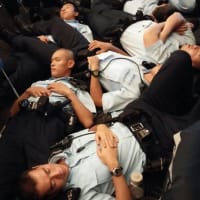



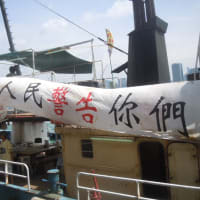

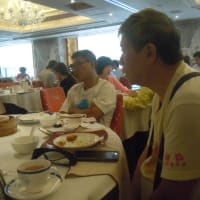
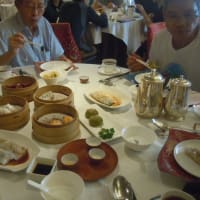
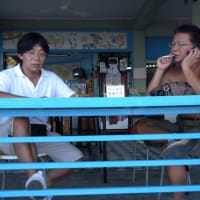
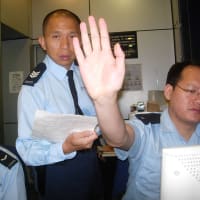
(South China Morning Post 2000.10.14 p.7)
WILLY WO-LAP LAM and AGENCIES---Despite Premier Zhu Rongji's attempts at reconciliation during his trip to Tokyo, Japanese students taking part in a rare televised interview session with the Prime Minister set for today claim they have been censored. Private broadcaster TBS said neither it nor China was putting any restrictions on questions that participants could ask. But some students were angry their questions had been rejected by TBS.
"My students are outraged because they wanted to ask serious questions about Chinese politics, such as how Zhu gets on with Chinese President Jiang Zemin or whether he thinks he'll survive the next generational change in Chinese leadership," a professor at the students' university said.
"But all those questions were rejected and they were told to ask: 'What kind of songs do you like?' "
The network wrote to participants saying China was not putting restrictions on what questions could be asked. But TBS added that as host, it wanted to ensure that the Prime Minister felt happy he had appeared on the show.
"If not, we will not only lose credibility as media but it could well turn into a diplomatic problem," the letter said.
The students may have been dissatisfied, but at higher diplomatic levels the message of reconciliation appeared to be making headway.
In a sign of warming bilateral relations a female crested ibis will arrive in Japan from China today for mating purposes under a Japan-China environmental agreement released yesterday, the Japanese Environment Agency said.
Mr Zhu continued his focus-on-the-people diplomacy while giving a short address at a lunch hosted in his honour by seven Japanese non-government organisations.
In a 10-minute speech on the future of bilateral ties, he referred to the friendship between the two peoples eight times. "The basis of friendship between China and Japan is friendship at the people's level," he said.
Earlier yesterday, the Japanese Government laid on an elaborate welcoming ceremony in the grounds of the State Guesthouse, where Mr Zhu and his wife Lao An are staying. Mrs Lao made a separate trip to a primary school.
Later, far-right protesters arrived at the talks venue, blaring anti-China slogans from a loudspeaker under the watch of 50 police officers. The activists demanded an end to aid to China.
Zhu highlights personable image while fielding questions on war past and need for formal apology
(Sunday Morning Post 2000.10.15 p.5)
WILLY WO-LAP LAM in Tokyo---In the first "meet-the-people" television show featuring a mainland leader, Premier Zhu Rongji took his message of friendship direct to ordinary Japanese even as he put up a spirited defence against his domestic critics.
Last night the Japanese network TBS aired a one-hour "town hall TV show" in which Mr Zhu fielded questions from an audience of about 100 people.
Questions were also posed by 20 selected members of the public in TBS's Osaka studio. The Premier also answered some of the 2,000 questions sent to the station by fax and e-mail.
While the focus of his trip was economic co-operation, the "question of history" took up much of the discussion. When a young Japanese asked why Beijing "endlessly harped" on the need for Japan to make a proper apology and pay compensation, Mr Zhu replied that Tokyo had never made a formal, written apology to Beijing.
"It is up to Japan whether to apologise or not," Mr Zhu said, adding he hoped the Japanese would consider the question carefully.
With a frankness rare among mainland politicians, Mr Zhu said he had been criticised at home for being "soft and weak". "On this trip I have not asked the Japanese people to make an apology, and I have been criticised by the people [in China]."
The Premier said that after he gave an interview to the Japanese media last week, he saw hundreds of messages on mainland Web sites faulting his "softness". Then he turned to the audience and asked" "Am I soft and weak? I hope everybody can make an assessment."
The host, TV personality Chikushi Tetsuya, asked Mr Zhu to confirm rumours that there had been attempts on his life or that he had asked his aides to prepare a coffin for him.
Mr Zhu would not comment on the stories. But he had previously told the audience that he had suffered injustices "far more times than you can imagine".
In a light moment, a woman asked Mr Zhu whether he was afraid of his wife, Lao An, who was in the audience. The Premier said: "I don't find her fearsome; on the contrary, she is very loveable."
The show ended when Mr Zhu played a short tune on a traditional erhu after an Osaka woman asked him to sing his favourite song. "My favourite song is the national anthem, but I don't want you all to have to stand up," Mr Zhu quipped.
After the programme, Tetsuya, who interviewed US President Bill Clinton last year, said: "Zhu displayed a lot of courage."
A mainland source said last night that while direct dialogue between mainland leaders and ordinary people in overseas countries was rare, Mr Zhu's TV appearance had achieved the intention of promoting bilateral ties.
(South China Morning Post 2000.10.16 p.9)
WILLY WO-LAP LAM and AGENCIES in Tokyo---Premier Zhu Rongji has expressed satisfaction that his Japan visit has achieved the objective of building bridges to both officials and ordinary people. However, apparent pressure put on a Tokyo TV station to withdraw controversial remarks the Premier had made during a "town hall TV meeting" on Saturday has reinforced the perception that Mr Zhu is subject to intense pressure back home.
"I held talks with ordinary people at a television show, and our friendship has been improved," Mr Zhu said on the fourth day of his Japanese tour.
During talks with leaders of Japan's opposition Social Democratic Party and the Japan Communist Party yesterday morning, Mr Zhu also tried to allay fears about the "China threat".
"China's defence outlay is less than one-third of Japan's," the semi-official China News Service quoted Mr Zhu as saying. "How can it be said that China constitutes a threat to Japan?"
At the weekend, Mr Zhu became the first Chinese leader to take part in a "meet-the-people" show on the TBS network when he met face-to-face with Japanese who asked him wide-ranging questions, including about China's demands for a formal apology over wartime atrocities.
When asked by reporters yesterday morning, Mr Zhu - who had left Tokyo for Yamanashi prefecture at the foot of Mount Fuji - gave a modest appraisal of his performance on TV, saying it was "about average".
Chinese officials travelling with Mr Zhu, however, said the show helped endear Chinese leaders to ordinary Japanese.
However, in the pre-taped version of the show, which was made a few hours before the show aired at 10pm local time, Mr Zhu admitted that he had been subject to criticism at home for being "soft and weak" towards Japan by not demanding an apology. The Premier also revealed that there were messages on mainland Web sites accusing him of "selling out national dignity" in return for economic aid.
These remarks, which were immediately reported by Japanese and international news agencies, were not aired in the final one-hour version. TBS denied any political pressure forced the company to cut the remarks.
"It was a pure, editorial decision," said Tateshi Sogi, a TBS spokesman. "We needed to shorten the programme as the talks were extended by more than 10 minutes."
It is understood, however, that TBS had an agreement with Chinese officials that the discussions between Mr Zhu and the audience would last about 70 minutes, and that mainland officials could make suggestions as to what to edit out.
Yesterday, Foreign Ministry spokesman Zhu Bangzao denied a report by a Hong Kong Chinese newspaper that Mr Zhu had commented favourably on the awarding of the Nobel Prize for Literature to Chinese-born Gao Xingjian on Thursday.